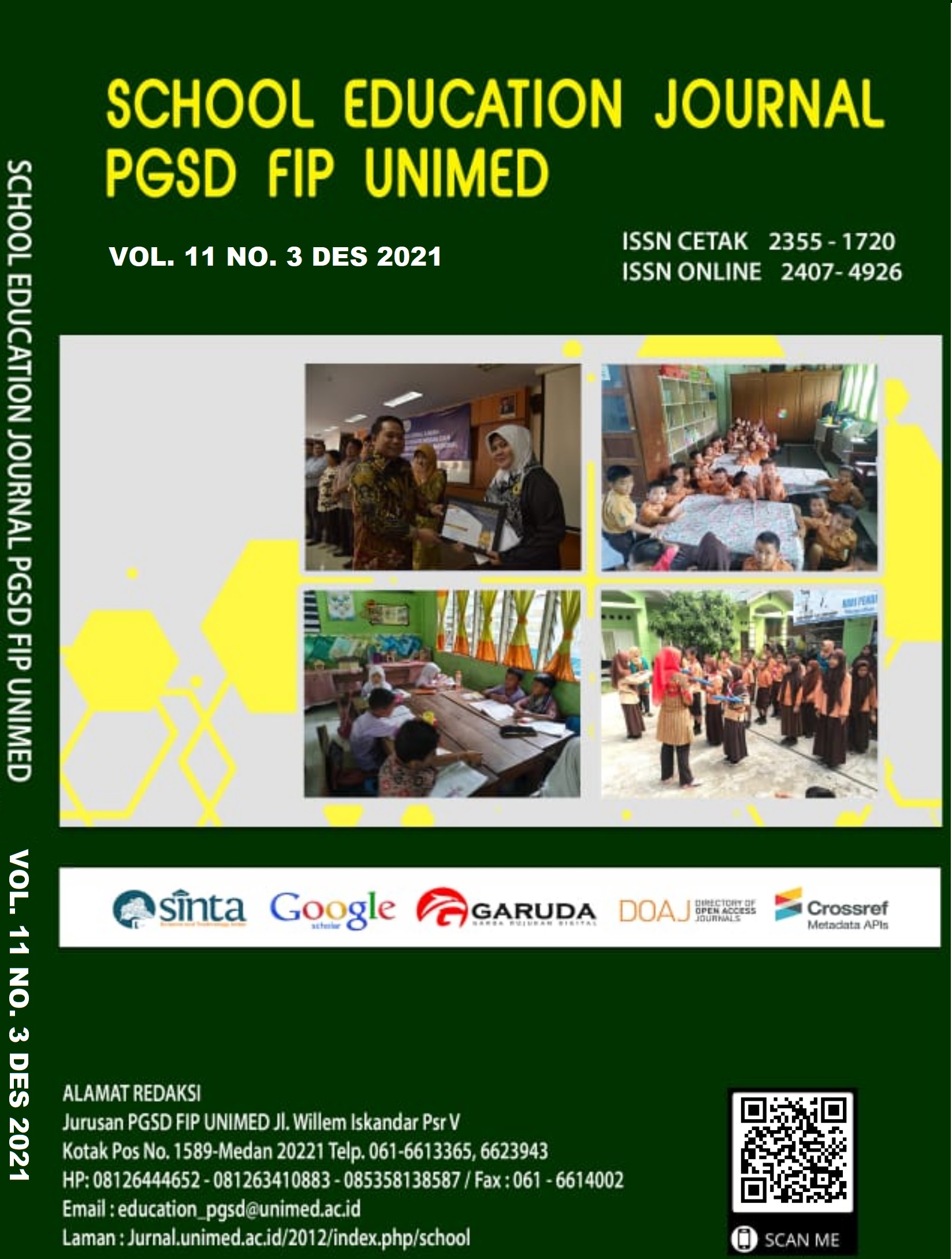PROGRAM LIFELONG LEARNING MERDEKA BELAJAR EDUKASI KOGNITIF MEWUJUDKAN SDGS GOAL 4 GUNA MENINGKATKAN KUALITAS SDM DI SLB MEDAN
DOI:
https://doi.org/10.24114/sejpgsd.v12i3.38859Keywords:
Lifelong Learning, Independent Learning, Cognitive Education, SDGs Goal 4, SLB Markus.Abstract
Lifelong Learning can be experienced by every learning community. Instilling the values of academic education with the aim of improving the quality of Human Resources can trigger schools to seek to optimize innovative learning. Freedom to learn cognitive education as a reference for lifelong learning programs seeks to realize inclusive and equitable quality education. It is believed that the Sustainable Development Goals (SDGs) that spur Indonesia's human development index need to be carried out at the Markus Medan Special School. This program is conducted for Markus SLB students for 1.5 months. The method used is participatory and experimental. During its implementation, students participate in building learning activities, so that data analysis is carried out qualitatively and quantitatively. The collected data is processed interactively and continuously until the data is saturated. The data are also interpreted descriptively through quantitative data measures. The results show that Markus Special School students can participate in cognitive education learning. Continuously, student learning products always influence their learning motivation, especially the results of drawing and motor skills of students. The experimental results showed a significant difference before and after experiencing cognitive education learning activities. As many as 60% of students get test scores above average.References
A. O. Safitri, V. D. Yunianti, and D. Rostika. 2022. Upaya Peningkatan Pendidikan Berkualitas di Indonesia: Analisis Pencapaian Sustainable Development Goals (SDGs). J. Basicedu, vol. 6, no. 4, pp. 7096“7106, 2022, doi: https://doi.org/10.31004/basicedu.v6i4.3296.
A. Ryllatt. 1999. Creating Training Miracles. Australia: AIM.
D. S. Winarni, J. Naimah, and Y. Widiyawati. 2020. Pengembangan Game Edukasi Science Adventure Untuk Meningkatkan Keterampilan pemecahan Masalah Siswa. J. Pendidik. Sains Indones, vol. 7, no. 2, pp. 91“100, 2020, doi: https://doi.org/10.24815/jpsi.v7i2.14462.
F. Aissiddiqi. 2020. Pendidikan Bagi Anak di Lembaga Pemasyarakatan Khusus Anak Kelas IIa Jakarta. Sch. Educ. J. Pgsd Fip Unimed, vol. 10, no. 1, pp. 17“26, 2020, doi: https://doi.org/10.24114/sejpgsd.v10i1.18543.
H. Yuhety and Y. Miarso. 2008. Indikator Mutu Program Pendidikan Sepanjang Hayat. Vol. 3, no. 2, pp. 159“170.
J. W. Creswell and J. D. Creswell. 2018. Research Design: Qualitative, Quantitative, Mixed Methods and Approaches. Fifth Edit. Los Angeles: SAGE Publications.
O. Dermawan. 2018. Strategi Pembelajaran Bagi Anak Berkebutuhan Khusus Di SLB. Psympathic J. Ilm. Psikol., vol. 6, no. 2, pp. 886“897, 2018, doi: https://doi.org/10.15575/psy.v6i2.2206.
P. M. Yusup and E. Saepudin. 2017. Praktik Literasi Informasi Dalam Proses Pembelajaran Sepanjang Hayat (Information Literacy Practices in the Process of Lifelong Learning). J. Kaji. Inf. dan Perpust., vol. 5, no. 1, p. 79, 2017, doi: https://doi.org/10.24198/jkip.v5i1.11387.
S. Sinaga. 2020. Penerapan Model Pembelajaran Discovery Learning Untuk Meningkatkan Keterampilan Proses Sains Dan Hasil Belajar Biologi Siswa Kelas VIII-6 SMP Negeri 1 Tebing Tinggi. Sch. Educ. J. Pgsd Fip Unimed, vol. 10, no. 4, pp. 379“388, 2020, doi: https://doi.org/10.24114/sejpgsd.v10i4.20960.
Sugiyono. 2015. Metode Penelitian Pendidikan (Pendekatan Kuantitatif, Kualitatif, dan R&D). Bandung: Alfabeta.
UNESCO. 2021. 4. Pendidikan Berkualitas. Bappenas.
Y. O. Pendi. 2020. Merdeka Belajar yang Tercermin dalam Kompetensi Profesional Guru Bahasa Inggris SMP Negeri 1 Sedayu. Di Seminar Nasional Pendidikan, pp. 291“299.
Downloads
Published
Issue
Section
License
Authors whose manuscripts are approved are approved as follows:
The publication rights for all journal manuscript materials published/published on the SEJ (School Education Journal) E-Journal site are held by the editorial board with the author's knowledge (moral rights remain with the manuscript authors).
The formal legal requirements for accessing this electronic digital journal article are subject to the terms of the Creative Commons Attribution-ShareAlike (CC BY) license, which means that E-Journal SEJ (School Education Journal) has the right to store, transfer media/format, manage in the form of a database, maintain, and publish articles without asking permission from the author as long as the author's name remains as the copyright owner.
Manuscripts published/published electronically are open access for educational, research, and library purposes.

